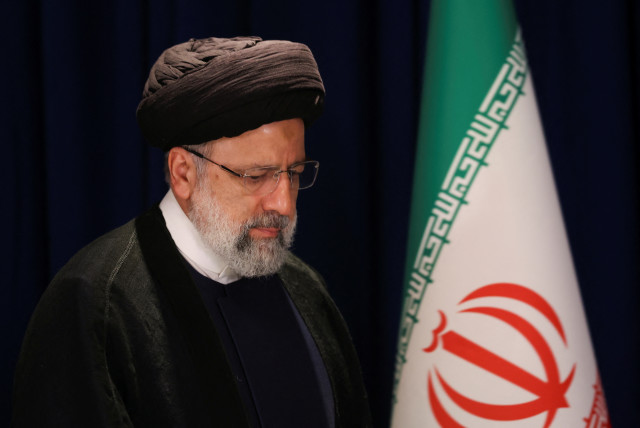Death of Raisi doesn't signify Israel's defense establishment can sleep well at night - editorial

Former national security adviser Yaakov Amidror predicted that neither Iran’s determination to wipe out Israel by producing nuclear weapons, nor its support of Hamas and Hezbollah would.
It’s a Jewish tradition to cherish life and mourn the dead.
Yet, there was a tear shed in Israel when the official announcement came early on Monday that Iranian president Ebrahim Raisi was confirmed to have died in Sunday’s helicopter crash in the country’s mountainous northwest. Also killed in the crash were Foreign Minister Hossein Amir-Abdollahian and other Iranian officials.
We don’t revel in anybody’s death, but Raisi’s reign of terror and death was a stain on humanity, and if his demise means that one fewer person will suffer, so be it.
'The butcher of Teheran'
As a young prosecutor in Tehran, Raisi earned his moniker – the ‘Butcher of Tehran’ – when he sat on a panel that oversaw the execution of hundreds of political prisoners in the capital in 1988, as Iran’s eight-year war with Iraq was coming to an end. Later, he set up a panel, known as “death committees” to hold swift arbitrary “trials” for thousands of detainees, a report by Amnesty International, which tallied the total killed at 5,000, said.
Asked about allegations that he had played a part in the death sentences, Raisi told reporters in 2021: “If a judge, a prosecutor, has defended the security of the people, he should be praised... I am proud to have defended human rights in every position I have held.”
A year after his election to the presidency in 2021, Raisi ordered tighter enforcement of Iran’s “hijab and chastity law” – restricting women’s dress and behavior.
Within weeks, a young Kurdish-Iranian woman, Mahsa Amini, died in custody after being arrested by morality police for allegedly breaking that law. The resulting months of nationwide protests presented one of the gravest challenges to Iran’s clerical rulers since the 1979 Islamic Revolution.
Reuters reported that hundreds were killed, according to rights groups, including dozens of security personnel who were part of a crackdown on the demonstrators.
Raisi’s reaction? “Acts of chaos are unacceptable.”
Regarding Israel and Jews, Raisi was just as intolerant and hateful. He questioned the integrity of the Holocaust in a 2022 interview on the American 60 Minutes, and he described Israel as a “false regime.” His solution to the Israel-Palestinian conflict: “The only solution is a Palestinian state from the river to the sea.” In addition, in January, he predicted that the Gaza war would lead to “Israel’s destruction.”
As expected, Iran’s proxies, Hamas and Hezbollah, that have been waging their battles against Israel on behalf of their cruel backer, issued statements of mourning over Raisi’s and his fellow Iranians’ deaths.
“These leaders supported the legitimate struggle of our people against the Zionist entity, provided valued support to the Palestinian resistance, and made tireless efforts in solidarity and support in all forums and fields for our people in the steadfast Gaza Strip during the Battle of al-Aqsa Flood,” Hamas said, referring to their barbarous October 7 attack on Israel.
Hezbollah eulogized Raisi as “a strong supporter, a staunch defender of our causes.”
Also expected were condolences from Iran’s Jewish community, who must toe a line of allegiance to the regime for their safety. Calling Raisi “compassionate and dedicated,” the representative of the Tehran Jewish Association reacted with “a heart full of sorrow and eyes brimming with tears,” while recognizing the significant loss of a leader revered for his service and humility.
At the same time, social media was full of expatriate Iranians celebrating Raisi’s death and voicing hope that freedom-loving Iranians would be able to exploit the opportunity to overturn the yoke of oppression that has plagued the Iranian people since 1979.
That likelihood is slim, as experts on Iran told The Jerusalem Post’s Tovah Lazaroff on Sunday. This does “nothing” for regime change, said Dr. Meir Javedanfar, an Iranian lecturer at Reichman University, as he explained that the impact would primarily be domestic.
Former national security adviser Yaakov Amidror predicted that neither Iran’s determination to wipe out Israel by producing nuclear weapons, nor its support of Hamas and Hezbollah would change following Raisi’s death, adding that it is Supreme Leader, Ayatollah Ali Khamenei who sets the country’s policies.
Although Israel can take solace in the knowledge that one of its arch-enemies has met a fiery end, there are more than enough just like him to prevent the country’s defense establishment from sleeping well at night.
Jerusalem Post Store
`; document.getElementById("linkPremium").innerHTML = cont; var divWithLink = document.getElementById("premium-link"); if (divWithLink !== null && divWithLink !== 'undefined') { divWithLink.style.border = "solid 1px #cb0f3e"; divWithLink.style.textAlign = "center"; divWithLink.style.marginBottom = "15px"; divWithLink.style.marginTop = "15px"; divWithLink.style.width = "100%"; divWithLink.style.backgroundColor = "#122952"; divWithLink.style.color = "#ffffff"; divWithLink.style.lineHeight = "1.5"; } } (function (v, i) { });

